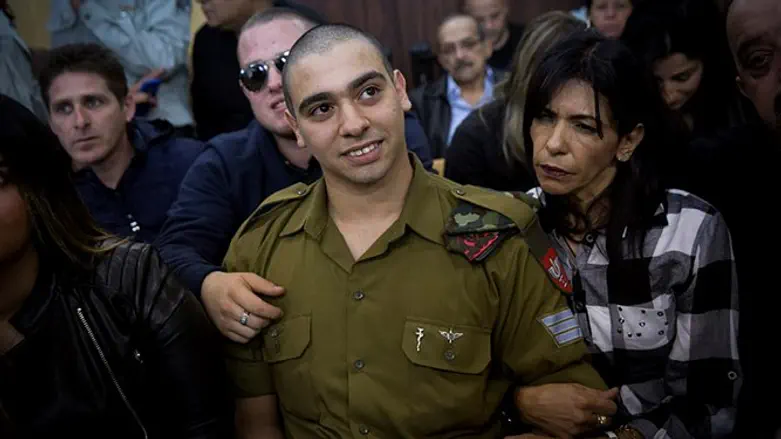
Attorneys Eyal Besserglick, Ilan Katz and Karmit Shachiver announced Wednesday that they are resigning from the defense team for Elor Azariya as they oppose submitting an appeal to the military court regarding Azariya's 18-month jail sentence.
Attorney Yoram Sheftel, who submitted the appeal to the military court, will conduct the case alone. Sheftel became famous when he defended John Demjanjuk, a former Nazi who was acquitted on appeal by the Israeli Supreme Court in 1986.
The original lawyers said that they had written a lengthy appeal and presented it to Sheftel but felt that they should try alternative methods to free Azariya. Since the family and Elor wished to continue with the appeal, they resigned from the case but said they would offer whatever assistance is required.
Sheftel submitted the appeal at the Military Court of Appeals Wednesday afternoon and will provide more details about the appeal at a press conference later on Wednesday.
After the verdict was handed down, Sheftel slammed military prosecutor Nadav Weisman for his conduct in the case.
The prosecution, argued Sheftel, went far beyond their duty to prosecute the case, aggressively pursuing the 21-year soldier in a “bloodthirsty” manner.
Sheftel noted that while the court convicted Azariya of manslaughter, judges balked at the three to five year prison sentence sought by prosecutors.
“During the whole length of the trial, all of the appearances, words, and general behavior of the chief army prosecutor [Nadav Weissman] suggested he was thirsty for Elor’s blood.
“And in effect the court, too, established that when it handed down a sentence that was half of the minimal sentence sought by the prosecutor.”
Sheftel also laid out some of the arguments planned in the appeal.
“The sentence, as has been stated, was based on the facts established in the verdict, and the verdict rested on two main claims,” said Sheftel. One of the claims “that immediately after the shooting Elor yelled ‘the terrorist stabbed my friend’,” continued Sheftel, “never happened. And It’s not just me saying that, it can be seen in 13 different video recordings presented to the court, all of which show that Elor said nothing after the shooting. He didn’t say a word.”
Sheftel added that the second claim, that Azariya had said to a friend of his that "the terrorist deserved to die because he stabbed my friend" had also not been substantiated by the video recordings, despite the fact that this was one of the main reasons given by the judges for their verdict. Sheftel said that this too "never happened."